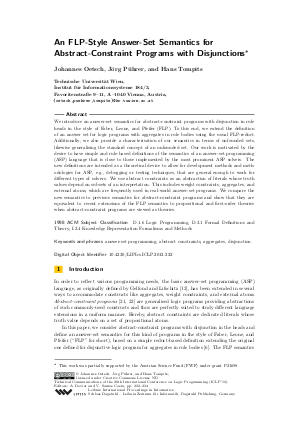An FLP-Style Answer-Set Semantics for Abstract-Constraint Programs with Disjunctions
Authors Johannes Oetsch, Jörg Pührer, Hans Tompits
-
Part of:
Volume:
Technical Communications of the 28th International Conference on Logic Programming (ICLP'12) (ICLP 2012)
Part of: Series: Leibniz International Proceedings in Informatics (LIPIcs)
Part of: Conference: International Conference on Logic Programming (ICLP) - License:
 Creative Commons Attribution-NoDerivs 3.0 Unported license
Creative Commons Attribution-NoDerivs 3.0 Unported license
- Publication Date: 2012-09-05
File

PDF
LIPIcs.ICLP.2012.222.pdf
- Filesize: 424 kB
- 13 pages
Document Identifiers
Subject Classification
Keywords
- answer-set programming
- abstract constraints
- aggregates
- disjunction
Metrics
- Access Statistics
-
Total Accesses (updated on a weekly basis)
0PDF Downloads0Metadata Views
Abstract
We introduce an answer-set semantics for abstract-constraint programs with disjunction in rule heads in the style of Faber, Leone, and Pfeifer (FLP). To this end, we extend the definition of an answer set for logic programs with aggregates in rule bodies using the usual FLP-reduct. Additionally, we also provide a characterisation of our semantics in terms of unfounded sets, likewise generalising the standard concept of an unfounded set. Our work is motivated by the desire to have simple and rule-based definitions of the semantics of an answer-set programming (ASP) language that is close to those implemented by the most prominent ASP solvers. The new definitions are intended as a theoretical device to allow for development methods and methodologies for ASP, e.g., debugging or testing techniques, that are general enough to work for different types of solvers. We use abstract constraints as an abstraction of literals whose truth values depend on subsets of an interpretation. This includes weight constraints, aggregates, and external atoms, which are frequently used in real-world answer-set programs. We compare the new semantics to previous semantics for abstract-constraint programs and show that they are equivalent to recent extensions of the FLP semantics to propositional and first-order theories when abstract-constraint programs are viewed as theories.
Cite As Get BibTex
Johannes Oetsch, Jörg Pührer, and Hans Tompits. An FLP-Style Answer-Set Semantics for Abstract-Constraint Programs with Disjunctions. In Technical Communications of the 28th International Conference on Logic Programming (ICLP'12). Leibniz International Proceedings in Informatics (LIPIcs), Volume 17, pp. 222-234, Schloss Dagstuhl – Leibniz-Zentrum für Informatik (2012)
https://doi.org/10.4230/LIPIcs.ICLP.2012.222
BibTex
@InProceedings{oetsch_et_al:LIPIcs.ICLP.2012.222,
author = {Oetsch, Johannes and P\"{u}hrer, J\"{o}rg and Tompits, Hans},
title = {{An FLP-Style Answer-Set Semantics for Abstract-Constraint Programs with Disjunctions}},
booktitle = {Technical Communications of the 28th International Conference on Logic Programming (ICLP'12)},
pages = {222--234},
series = {Leibniz International Proceedings in Informatics (LIPIcs)},
ISBN = {978-3-939897-43-9},
ISSN = {1868-8969},
year = {2012},
volume = {17},
editor = {Dovier, Agostino and Santos Costa, V{\'\i}tor},
publisher = {Schloss Dagstuhl -- Leibniz-Zentrum f{\"u}r Informatik},
address = {Dagstuhl, Germany},
URL = {https://drops.dagstuhl.de/entities/document/10.4230/LIPIcs.ICLP.2012.222},
URN = {urn:nbn:de:0030-drops-36246},
doi = {10.4230/LIPIcs.ICLP.2012.222},
annote = {Keywords: answer-set programming, abstract constraints, aggregates, disjunction}
}
